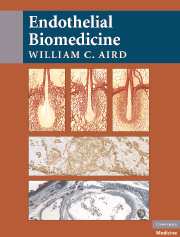Book contents
- Frontmatter
- Contents
- Editor, Associate Editors, Artistic Consultant, and Contributors
- Preface
- PART I CONTEXT
- PART II ENDOTHELIAL CELL AS INPUT-OUTPUT DEVICE
- PART III VASCULAR BED/ORGAN STRUCTURE AND FUNCTION IN HEALTH AND DISEASE
- PART IV DIAGNOSIS AND TREATMENT
- PART V CHALLENGES AND OPPORTUNITIES
- 187 Introductory Essay: Complexity and the Endothelium
- 188 Agent-Based Modeling and Applications to Endothelial Biomedicine
- 189 Scale-Free Networks in Cell Biology
- 190 Cell Fates as Attractors: Stability and Flexibility of Cellular Phenotypes
- 191 Equation-Based Models of Dynamic Biological Systems
- 192 Vascular Control through Tensegrity-Based Integration of Mechanics and Chemistry
- 193 Simulating the Impact of Angiogenesis on Multiscale Tumor Growth Dynamics Using an Agent-Based Model
- 194 New Educational Tools for Understanding Complexity in Medical Science
- 195 Endothelial Biomedicine: The Public Health Challenges and Opportunities
- 196 Conclusion
- Index
- Plate section
194 - New Educational Tools for Understanding Complexity in Medical Science
from PART V - CHALLENGES AND OPPORTUNITIES
Published online by Cambridge University Press: 04 May 2010
- Frontmatter
- Contents
- Editor, Associate Editors, Artistic Consultant, and Contributors
- Preface
- PART I CONTEXT
- PART II ENDOTHELIAL CELL AS INPUT-OUTPUT DEVICE
- PART III VASCULAR BED/ORGAN STRUCTURE AND FUNCTION IN HEALTH AND DISEASE
- PART IV DIAGNOSIS AND TREATMENT
- PART V CHALLENGES AND OPPORTUNITIES
- 187 Introductory Essay: Complexity and the Endothelium
- 188 Agent-Based Modeling and Applications to Endothelial Biomedicine
- 189 Scale-Free Networks in Cell Biology
- 190 Cell Fates as Attractors: Stability and Flexibility of Cellular Phenotypes
- 191 Equation-Based Models of Dynamic Biological Systems
- 192 Vascular Control through Tensegrity-Based Integration of Mechanics and Chemistry
- 193 Simulating the Impact of Angiogenesis on Multiscale Tumor Growth Dynamics Using an Agent-Based Model
- 194 New Educational Tools for Understanding Complexity in Medical Science
- 195 Endothelial Biomedicine: The Public Health Challenges and Opportunities
- 196 Conclusion
- Index
- Plate section
Summary
The factors that have caused the endothelium to be an under-recognized and underemphasized organ system are the same reasons that make it a challenging topic for students and teachers alike. The endothelial cell (EC) is hidden from view, seen only by microscopy rather than at the gross anatomical level. Because it participates in all vascular structures, it is often regarded as part of other organs, rather than as a distinct entity. Its distribution throughout the body results in interactions that are multiple and complex, which means that it cannot be discussed without a prior understanding of other organ systems. The endothelium is not readily evaluated by specific diagnostic tests, and at the cognitive level, the endothelium may not evoke a specific mental image as would the heart, for instance. To fully understand the complexity of endothelial biomedicine, new educational tools may be useful in complementing traditional teaching approaches.
Technological advances in the past few decades have had dramatic consequences on how the biomedical sciences are being taught. Educators can now harness the power of technology to manage enormous amounts of information and to deliver content in a manner that promotes high-level, experiential learning. Medical simulation is one area that is revolutionizing medical education. Broadly defined, medical simulation refers to the controlled reproduction of physiologic or clinical environments. For our purposes, we will consider it to be “a model of some phenomenon or activity that users learn about through interaction with the simulation” (1). In the most effective educational simulations, learner-driven exploration and experience lead to enhanced understanding of complex phenomena.
- Type
- Chapter
- Information
- Endothelial Biomedicine , pp. 1799 - 1806Publisher: Cambridge University PressPrint publication year: 2007
- 1
- Cited by



